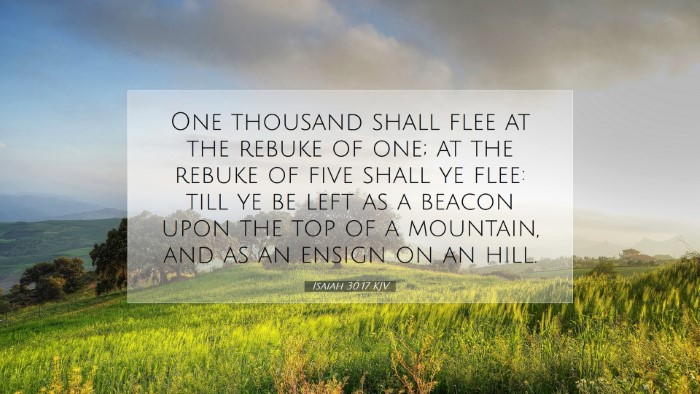Commentary on Isaiah 30:17
Verse: “One thousand shall flee at the rebuke of one; at the rebuke of five shall ye flee: till ye be left as a flag upon the top of a mountain, and as an ensign on a hill.” (Isaiah 30:17)
Introduction
The verse Isaiah 30:17 illustrates the profound consequences of divine rebuke and the resultant fear that ensues when nations turn away from God. It serves as a reflection on the efficacy of a righteous rebuke, demonstrating that even a small number of soldiers can cause great fear among the unfaithful. This commentary draws insights from various public domain commentators to elucidate the theological, historical, and practical implications of this verse.
Theological Insights
Isaiah, as a prophet, often dealt with themes of judgment, redemption, and the sovereignty of God. In this particular verse, the idea expressed is that a significant defeat can result from God's judgment. Even one individual, inspired or empowered by God, can put a thousand to flight.
- Matthew Henry's Commentary: Henry emphasizes the power of God in the lives of His people. He notes that when God's judgment is pronounced, it leads to panic and disarray among the unrighteous. The flight of a thousand at the rebuke of one is a metaphorical representation of the drastic consequences that ensue when God's hand is against a people.
- Albert Barnes' Notes: Barnes elaborates on the metaphor of the flag and ensign, indicating that their positions symbolize vulnerability and despair. He asserts that those who rebel against God will find themselves exposed and scattered, much like a flag left alone in a high place, signifying defeat and abandonment.
- Adam Clarke's Commentary: Clarke underscores the spiritual implications of fleeing from God’s judgment. He posits that the imagery of fleeing at the mere utterance of rebuke speaks to the tangible reality of spiritual and physical warfare. Clarke's insights relate this to the broader scope of reliance on God's strength rather than human might.
Historical Context
The historical setting of Isaiah’s prophecy plays a critical role in the understanding of this verse. During the time, the Kingdom of Judah faced threats from Assyria. Instead of trusting in God, the leadership sought alliances with Egypt, which Isaiah condemned. This passage serves as a warning against misplaced reliance on human powers and the consequent chaos that results when one strays from divine guidance.
Practical Applications
For pastors, students, theologians, and scholars, Isaiah 30:17 offers numerous application points:
- Dependence on God: The verse emphasizes the essential truth that true strength and deliverance come from God. It encourages reliance on divine strength rather than on numerical superiority or human alliances.
- Understanding Divine Judgment: This text compels a study of God’s patience and eventual judgment. It reminds believers of the consequences of sin and the importance of returning to God before calamity strikes.
- Intercessory Prayer: The fact that “one” can put “a thousand” to flight reminds the church of the power of prayer and intercession. Believers, group-oriented like flags in battle, can have significant impacts through united prayer.
Conclusion
Isaiah 30:17 serves as a powerful reminder of the implications of turning away from God and the tremendous might of divine authority. Through various commentators, we grasp a multifaceted understanding of the text that appeals profoundly to those in ministry and scholarship. As we reflect on this passage, let us consider our own reliance on the Lord, and may it encourage us to boldly trust in His judgment and deliverance.


